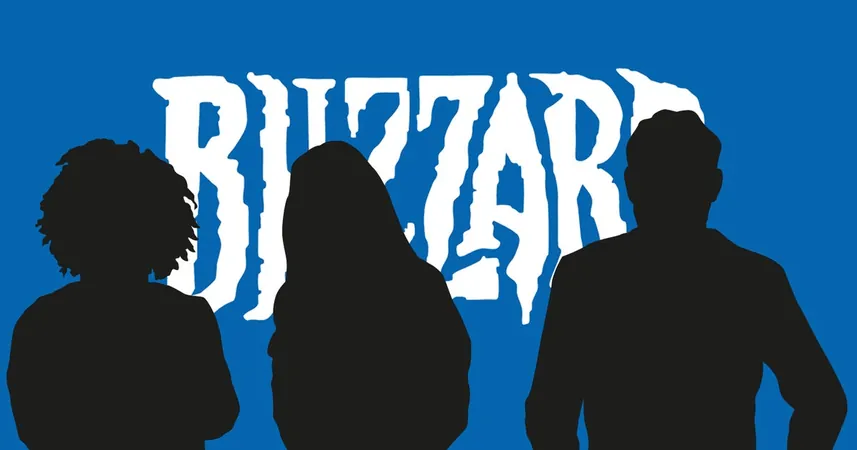
Uncovering Activision Blizzard: Jason Schreier Reveals Misconduct, Sex Parties, and Industry Secrets
2024-10-08
Author: Kai
Few gaming giants evoke the same passion as Blizzard Entertainment. For the countless employees who dedicated their careers to developing iconic titles like *World of Warcraft*, *Diablo*, *StarCraft*, *Hearthstone*, and *Overwatch*, Blizzard represented not just a career landmark but a social epicenter and a collaborative dream fulfilled. Thus, the unfolding narrative of corporate greed and the shocking allegations of harassment within the company has deeply affected those connected to it.
In his thought-provoking book, *Play Nice*, journalist Jason Schreier recounts Blizzard’s saga, drawing on comprehensive interviews with employees—past and present. Released today in both the UK and North America, Schreier delves into Blizzard's storied 33-year history, underscoring the transformative corporate takeover by Activision and its repercussions, including this year's significant layoffs.
During a recent conversation about his book, Schreier discussed his initial framing, which initially focused solely on Blizzard's recent history amid its drastic changes, including lawsuits and significant leadership shifts. However, the deeper he dug into interviews, especially with veterans from the early days, the more he recognized that to understand the current climate at Blizzard, one must explore its cultural roots back to the 1990s.
The allegations surrounding Blizzard reached a fever pitch in 2021, when California’s lawsuit against the company exposed grave issues of sexual harassment and discrimination. According to Schreier, this landmark lawsuit played a pivotal role in encouraging former employees to share their experiences. In contrast to earlier inquiries, when women often felt individual stories went unheard, the lawsuit galvanized a collective voice, akin to the waves of the #MeToo movement.
Schreier notes the abrupt dismissal of Ben Kilgore, a high-ranking executive at Blizzard, as a critical moment that hinted at the culture of misconduct overshadowing the company's operations. Initially ignored during quiet times, these stories found new life after the lawsuit, creating an opportunity for others to come forward, acknowledging shared experiences of harassment and discrimination.
One of the more controversial elements Schreier explored in *Play Nice* is the blurred line between professionalism and personal relationships at Blizzard, where some senior staff engaged in swinger parties and casual hookups, often leading to a toxic environment. While these encounters were consensual on the surface, they fostered a culture that compromised workplace dynamics, leading employees to question the integrity of promotions and advancements. The intertwining of professional and personal lives, coupled with a culture of drinking and partying, contributed significantly to the allegations of misconduct.
Amidst all this intrigue, Blizzard's ambitious plans for a new wave of streaming content were abruptly halted. Bobby Kotick’s vision of transforming Activision Blizzard into a dynamic multimedia entity fell flat amidst legal disputes, particularly concerning Netflix partnerships that fizzled out in the wake of controversy.
As *Play Nice* unfolds, Schreier emphasizes that the complexities surrounding Blizzard reflect broader patterns in corporate culture and the gaming industry. He illustrates that the narrative is neither completely good nor bad—emphasizing a deeper truth about human experiences in professional environments fraught with historic biases and shifts over time.
In closing, while the publication has garnered myriad conversations regarding Blizzard’s toxic work culture, it opens the door for discussions about accountability, transparency, and the need for significant reform in every corporate structure, particularly those as influential as Blizzard's. With hints of possible future literature focusing on Activision, Schreier invites readers to reflect on the broader implications of corporate culture within the gaming community and beyond.
*Will the revelations in *Play Nice* spark the changes needed to reform workplace practices in the gaming industry? Only time will tell, but one thing is clear: the story of Blizzard is far from over.*




 Brasil (PT)
Brasil (PT)
 Canada (EN)
Canada (EN)
 Chile (ES)
Chile (ES)
 España (ES)
España (ES)
 France (FR)
France (FR)
 Hong Kong (EN)
Hong Kong (EN)
 Italia (IT)
Italia (IT)
 日本 (JA)
日本 (JA)
 Magyarország (HU)
Magyarország (HU)
 Norge (NO)
Norge (NO)
 Polska (PL)
Polska (PL)
 Schweiz (DE)
Schweiz (DE)
 Singapore (EN)
Singapore (EN)
 Sverige (SV)
Sverige (SV)
 Suomi (FI)
Suomi (FI)
 Türkiye (TR)
Türkiye (TR)